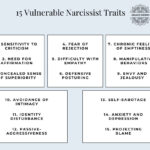Why a Narcissist Won’t Divorce You – Understanding The 26 Psychological Factors Behind Their Reluctance

Why a Narcissist Won’t Divorce You – Understanding The 26 Psychological Factors Behind Their Reluctance
“Why a narcissist won’t divorce you” is a question that haunts countless individuals trapped in toxic relationships. If you find yourself trapped in a marriage with a narcissist, you may have realized that breaking free from their grasp is an arduous battle.
Despite your earnest efforts, the narcissist seems determined to keep you entangled in their web of control. In this article, I will shed light on the underlying dynamics of narcissistic behavior. We will uncover 26 psychological factors that fuel their resistance to divorce. Understanding these complexities is crucial for you to start healing and reclaiming your life.
If you’re interested in healing from narcissistic abuse, I warmly welcome you to my Narcissistic Abuse Recovery Program. It’s an easy self-paced online course which you can do at your own pace. My signature program combines scientific and spiritual tools for holistic healing of the body, mind, and spirit.
26 Reasons Why a Narcissist Won’t Divorce You
1. Control:
Narcissists thrive on controlling others and may see divorce as a loss of power over their spouse. The thought of relinquishing control terrifies them. It undermines their ability to dictate and manipulate every aspect of their partner’s life.
Divorce signifies a shift in the power dynamic, granting the spouse more autonomy and independence. To a narcissist, this loss of control is akin to a threat to their very existence. Consequently, they will employ every tactic at their disposal to maintain their grip, ensuring they remain in the dominant position.
2. Ego Protection:
Divorcing a narcissist may be perceived as a devastating blow to their ego. It shatters the carefully crafted image of superiority and invincibility they project. For a narcissist, admitting the failure of a marriage and facing the reality of rejection challenges their fragile self-esteem.
The idea of being seen as “unsuccessful” or “unworthy” can be unbearable. It triggers a desperate need to cling onto the marriage, even if it means perpetuating an unhealthy and unhappy relationship. By avoiding divorce, they maintain the illusion of control and preserve their fragile ego from further damage.
3. Image Maintenance:
Another reason why a narcissist won’t divorce you is to protect their image and reputation. Narcissists are often deeply concerned about their public image and the perception of others. Divorce, with its associated conflicts and negative connotations, can significantly tarnish the carefully constructed façade they have created.
They fear that their true nature may be exposed to those around them. This can potentially damage their reputation, social standing, and the admiration they receive. The thought of being seen as flawed or incapable of maintaining a successful marriage threatens their grandiose self-image. This compels them to resist divorce at all costs.
4. Financial Manipulation:
Divorce entails the division of assets and financial arrangements. Narcissists may view this as an opportunity to manipulate and maintain control over their spouse. They may employ various tactics to gain a financial advantage. Such tactics include hiding assets, undervaluing their worth, or using complex legal strategies to prolong the proceedings.
By refusing to divorce you and keeping the divorce process complicated, they can exploit the situation to their benefit. This is a manipulative way of ensuring they maintain a significant hold over their spouse’s finances and resources.
5. Fear of Exposure:
Divorce proceedings have the potential to bring to light the narcissist’s true nature, including their manipulative behaviors, one of the 12 traits of a narcissist. A narcissist is deeply fearful of being exposed and having their carefully guarded persona shattered.
The prospect of their spouse or others learning about their deceitful actions or abusive patterns terrifies them. By refusing divorce, they can try to keep the truth concealed, maintain their control over the narrative, and avoid facing the consequences of their actions.
6. Loss of Narcissistic Supply:
A narcissist won’t divorce you if they know that you can still provide them with narcissistic supply. Even if they always seem unhappy in the relationship, they would rather stay in a toxic environment.
The spouse serves as a vital source of narcissistic supply, feeding their insatiable need for affirmation and bolstering their fragile self-esteem. The thought of severing this crucial supply can be terrifying, leading narcissists to cling to the relationship, even if it is unhealthy or abusive, to continue feeding their ego.
7. Sense of Ownership:
This is one of many narcissist red flags! Partners are often perceived by narcissists as possessions rather than autonomous individuals with their own rights and desires. The idea of letting go may be inconceivable to them as they feel entitled to control and dominate every aspect of their partner’s life.
Divorce challenges this sense of ownership and control, posing a direct threat to their distorted perception of the relationship. They may resist divorce vehemently, unwilling to relinquish their perceived possession and dominance over their spouse.
8. Power Play:
For narcissists, refusing to divorce can become a power play, a means to exert dominance and assert their superiority over their spouse. By refusing to grant the divorce or prolonging the process, they maintain control and manipulate the power dynamic in their favor.
This power play feeds their inflated ego, allowing them to continue exerting dominance over their spouse, ensuring that they remain subservient and reinforcing the narcissist’s sense of superiority.
Related: Setting Boundaries with a Narcissist
9. Legal Battles:
Narcissists may relish the opportunity to engage in lengthy and contentious legal proceedings, using them as a means to further manipulate and control their spouse. By prolonging the divorce process, they can exhaust their partner emotionally, financially, and psychologically, ensuring their continued dominance and control.
Legal battles become a tool for them to exert power, exert influence over the proceedings, and potentially secure more favorable outcomes that align with their desires.
10. Fear of Abandonment:
Underneath their grandiosity, one of the characteristics on the narcissist checklist, they often harbor deep-seated insecurities and an intense fear of being abandoned. This fear drives them to cling onto their spouse through a refusal to divorce, as they perceive separation as a direct threat to their emotional well-being.
They will go to great lengths to avoid abandonment, even if it means maintaining an unhealthy or toxic relationship, as the alternative is too unbearable for them to face.
11. Dependency:
Some narcissists rely heavily on their spouse for emotional, financial, or other forms of support. Divorce represents a significant disruption to their dependency, as it forces them to confront the possibility of being alone and managing life without their partner’s assistance.
The prospect of having to be self-reliant and take responsibility for their own needs and well-being can be overwhelming for narcissists, leading them to resist divorce in order to maintain their dependent position.
12. Revenge:
Revenge is another common reason why a narcissist won’t divorce you. Divorce can be seen as an opportunity for a narcissist to inflict emotional pain on their spouse. They may hold onto perceived slights, grievances, or feelings of betrayal, and view divorce as the perfect platform to retaliate.
By prolonging the divorce process or making it as acrimonious as possible, they can derive a sense of satisfaction from causing emotional distress and pain to their spouse, further asserting their control and dominance.
13. Superiority Complex:
Narcissists often harbor an unwavering belief in their superiority over others, including their spouse. Refusing to divorce becomes a way for them to assert and reinforce this supposed superiority.
By denying the divorce, they maintain a position of power and control, effectively sending the message that their partner is not worthy of being released from the marriage. This refusal to divorce becomes another opportunity for narcissists to demonstrate their perceived superiority and reinforce their inflated self-image.
14. Lack of Empathy:
People who suffer from a narcissistic personality disorder have a profound lack of empathy, making it difficult for them to understand or relate to the emotions and needs of others.
This inherent lack of empathy contributes to their resistance to divorce, as they struggle to consider the impact it may have on their spouse. Their self-centered worldview and inability to truly comprehend the emotional consequences further solidify the unwillingness of a narcissist to initiate the divorce process.
15. Entitlement:
Narcissists possess an overwhelming sense of entitlement, believing they deserve special treatment and that their spouse should remain by their side regardless of the circumstances.
They view their partner as an extension of themselves, and the idea of their spouse seeking independence or leaving the relationship challenges their entitled mindset. This entitlement fuels their refusal to divorce, as they cannot fathom a reality in which their needs and desires are not prioritized above all else.
16. Fear of Intimacy:
Divorce signifies the end of an intimate relationship, which can trigger a narcissist’s deep-seated fear of emotional vulnerability and intimacy. Narcissists often struggle with genuine emotional connections, as they fear being exposed and potentially rejected.
The prospect of divorce forces them to confront their fear head-on, intensifying their resistance as they desperately cling to the familiarity and control offered by the current relationship.
17. Need for Control Over Children:
If children are involved, a narcissist may exploit the divorce process as a means to manipulate and control their spouse’s access to the children. They also view their children as extensions of themselves, using them as pawns to exert control and dominance over their spouse.
By manipulating the children’s involvement in the divorce process, they further solidify their power and ensure their advantage. This strategic approach allows narcissists to maintain a sense of control not only over their spouse but also over the family dynamics. As you can see the narcissist is always attempting to reinforce their dominance.
18. Perceived Threat to their Identity:
Divorce can be a jarring experience for narcissists as it forces them to confront their own flaws and shortcomings, which can deeply wound their fragile ego.
Ending the marriage may make them question their self-perception as perfect or superior, leading to a painful realization that they are not infallible. The threat to their carefully constructed self-image and the prospect of being perceived as a failure can be excruciating for a narcissist, fueling their resistance to divorce.
19. Social Connections:
Some narcissists rely heavily on their spouse’s social connections, friendships, and family ties. Divorce poses a risk of losing these valuable social networks that provide validation, admiration, and support.
The fear of being isolated or having their social standing diminished can drive narcissists to resist divorce, as they cling onto the relationships and connections that bolster their grandiose self-image.
20. Fantasy of Reconciliation:
Fantasizing of reconciling with their spouse is another reason why a narcissist won’t divorce you. They believe that they can change their partner’s mind which would boost their ego as they feel like they are winning.
They may manipulate the divorce process to keep hope alive, fostering the belief that a reconciliation is possible. This fantasy serves their ego, allowing them to maintain a sense of control and avoid facing the reality of the failed relationship.
21. Lack of Remorse:
A narcissist’s lack of genuine remorse for their actions can contribute to their resistance to acknowledging the harm they have caused. They may refuse to take responsibility for their behaviors. Most often they deflect blame onto their spouse, or downplay the impact of their actions.
Their lack of remorse hinders divorce proceedings, as it demands facing consequences and personal shortcomings.
22: Desire to Punish:
Divorce can be seen as an opportunity for a narcissist to punish their spouse for any perceived wrongdoing or as a response to their wounded pride. They may use the divorce proceedings as a way to exert control and inflict emotional pain on their partner.
This delusion reinforces their resistance, as they manipulate the divorce process to serve their self-interests, refusing to let go of perceived dominance.
23: Need for Drama:
If you’ve been married to a narcissist, you must know that they love drama and chaos. It’s a way of seeking attention and control through the creation of turmoil. The divorce process presents a perfect stage for them to engage in manipulative tactics.
They use the divorce to prolong conflicts, and stir up emotions to maintain their desired level of excitement. By resisting divorce, they can continue to orchestrate a high-drama narrative. This way they keep themselves at the center of attention and assert their power and influence over their spouse.
24. Fear of Rejection:
Narcissists have an intense fear of rejection, which explains why a narcissist won’t divorce you. They rely heavily on their spouse for validation and admiration, and the thought of being rejected by them is unbearable. Divorce signifies a rejection of the narcissist at a fundamental level, triggering deep-seated insecurities and feelings of worthlessness.
To avoid facing this rejection, they may go to great lengths to manipulate the situation. This helps them feel like they can maintain control, and prevent the dissolution of the relationship.
25. Delusion of Control:
A narcissist refuses to divorce you based on their delusional belief that they have ultimate control over the situation. Their inflated self-importance leads them to believe they can control the outcome, disregarding their spouse’s wishes.
This delusion of control reinforces their resistance. They refuse to let go of their perceived dominance and manipulate the divorce process to serve their self-interests.
26. Fear of Losing Assets:
Narcissists may resist divorce due to the fear of losing their share of assets or the financial support provided by their spouse. Additionally, the prospect of financial instability can intensify their resistance to end the marriage. Divorce often involves dividing property, assets, and potentially paying spousal support or alimony.
They may be unwilling to relinquish their financial advantages or the lifestyle they have become accustomed to. This leads them to drag out the divorce process or refuse it altogether. Their desire to maintain their financial security can override any considerations for the emotional well-being or freedom of their spouse.
Related: Signs You’re Healing From Narcissistic Abuse
Will a Narcissist Divorce You?
The question of whether a narcissist will file for divorce can be complex and dependent on various factors. While a narcissist may express a desire to file for divorce, it’s important to consider the underlying motivations and potential outcomes.
According to the narcissistic personality disorder statistics, there are more single narcissists (9.6%), followed by 7.3% divorced or separated, while 4.9% of narcissists are married.
It is also possible that a narcissist may regret divorce later on. The fear of facing the reality and consequences of their actions sets in and terrifies them. We have explored 26 reasons why a narcissist may resist divorce, ranging from control issues to a fear of abandonment. It is also worth noting that some narcissists may use the threat of divorce as a manipulative technique to exert control over their partner.
In the event that a narcissist genuinely wants a divorce, it may indicate that they have found new narcissistic supply elsewhere. Although this may initially be painful, it can serve as an opportunity for you to break free from the torment of the narcissistic relationship.
Their decision to divorce can inadvertently grant you the chance to liberate yourself from the nightmarish circumstances you have endured.
Related: Healing from Narcissistic Abuse
Overcoming the Resistance to Divorce
Navigating a divorce with a narcissist can be an uphill battle, as their resistance to part ways is fueled by a complex interplay of psychological, emotional, and manipulative factors. Understanding these dynamics is essential in breaking free from their control and reclaiming your life.
Remember that you are not alone in this journey. By seeking support, guidance, and empowerment from a community of individuals who have experienced similar challenges, you can find the strength to overcome the resistance and heal from the effects of a narcissistic relationship.
Take the first step towards your transformation by joining our healing program and online community. Together, we can navigate the path towards a brighter future.
My Related Services:
–Narcissistic Abuse Recovery Program: Join a structured program that provides tools, resources, and guidance to help you navigate and heal from the impact of narcissistic abuse.
–Mindfulness Meditation Practice: Discover the power of mindfulness with me as your meditation teacher. This practice has been a transformative tool in helping me gain mental clarity, rebuild self-trust, and respond consciously rather than reacting impulsively. Book a free call today and learn how mindfulness can calm your nervous system and bring peace into your life.
–Email Advice: Get guidance, insights, and support directly to your inbox.
FAQs
A narcissist may resist divorce due to their desire for control, fear of losing power or assets, and the need for narcissistic supply from their spouse. They may also view divorce as a blow to their ego and be reluctant to face the reality of their actions.
While every situation is unique, a narcissist may resist divorce due to their fear of abandonment, desire for control, or fear of losing their narcissistic supply. However, in some cases, a narcissist may initiate divorce if they find new sources of narcissistic supply.
Attempting to convince a narcissist to divorce can be challenging as they are resistant to relinquishing control. It is important to prioritize your own well-being, seek support from professionals, establish boundaries, and consider legal options to protect yourself during the divorce process.
In a divorce, a narcissist may seek to maintain control, manipulate the situation to their advantage, and secure financial benefits or assets. They may also aim to inflict emotional pain, seek revenge, or use the divorce proceedings for power play and maintaining their perceived superiority.
Narcissists may frequently threaten divorce as a manipulative tactic to control and exert power over their spouse. It is a way to maintain dominance, instill fear, and keep their partner in a state of emotional turmoil.
Additional Resources:
Narcissist Memes
Do Narcissists Cry?
Narcissist and Empath
How to Deal with a Narcissist
Narcissistic Abuse Therapy





